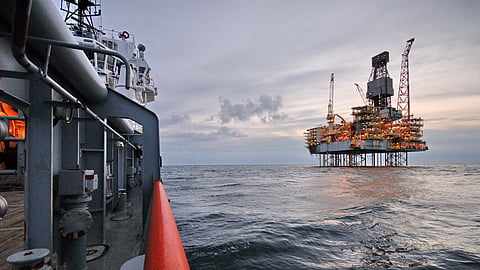

Russia's Lukoil has until December 13 to negotiate the sale of the bulk of its international assets after the US imposed sanctions on the company and rejected its initial buyer, Swiss commodity trader Gunvor.
Lukoil’s international assets, spanning upstream oil and gas projects, refining, and more than 2,000 filling stations across Europe, Central Asia, the Middle East and the Americas, are estimated to be worth about $22 billion.
Any specific deals will require US Treasury approval.
Below are details of Lukoil's international assets and potential buyers:
Interested parties include US oil majors Exxon Mobil and Chevron Corp, Abu Dhabi conglomerate International Holding Company, Austrian investor Bernd Bergmair - former majority owner of an adult entertainment group including website Pornhub - Hungary’s MOL and US private equity firm Carlyle.
Lukoil’s biggest foreign asset is a 75 per cent stake in Iraq’s West Qurna 2, one of the world’s largest oilfields. It declared force majeure at the field after Iraq halted payments. At least two Western and one Chinese company are eyeing the stake, Iraqi officials said. Reuters reported exclusively on December 2 that Exxon Mobil had approached the Iraqi oil ministry about a purchase.
Lukoil also owns 60 per cent of Iraq’s Block 10 development, which includes the Eridu field west of Basra.
In Egypt, it holds a 50 per cent stake in the West Esh El Mallaha (WEEM) and WEEM Extension oilfields alongside Egypt’s Tharwa Petroleum. It also holds a 24 per cent stake in the Meleiha concession, with the rest owned by Italy’s Eni.
In the UAE, Lukoil owns 10 per cent of the Ghasha concession, one of Abu Dhabi’s largest gas developments, operated by ADNOC.
Lukoil holds 13.5 per cent in Karachaganak and five per cent in Tengiz - major Kazakh oil and gas projects operated by Western oil companies. It also has a 12.5 per cent stake in the Caspian Pipeline Consortium, which exports oil from Kazakhstan to the Black Sea.
The US Treasury has allowed Lukoil’s transactions involving Karachaganak, Tengiz and CPC.
The Russian firm also owns nearly 20 per cent of the BP-operated Shah Deniz gas field in the Azerbaijani sector of the Caspian Sea. It also operates the South-West Gissar gas field in Uzbekistan and holds a 90 per cent stake in the Kandym fields development near the country’s border with Turkmenistan.
Lukoil has a 38 per cent interest in the Deepwater Tano Cape Three Points block that includes the Pecan oilfield development off Ghana. It also has 25 per cent in Eni-operated gas block Marine XII offshore Congo and 18 per cent in Chevron-operated exploration block OML 140 off Nigeria.
In Mexico, it partners with Eni in several offshore blocks and owns 50 per cent of the Amatitlan block, operated by Petrolera de Amatitlan SAPI de CV.
In Bulgaria, Lukoil owns the 190,000 barrels per day Neftohim Burgas refinery, the largest in the Balkans. The Bulgarian Government has made legal changes to seize and sell the assets.
The US Treasury has allowed transactions involving Lukoil’s refinery and some of its other assets in Bulgaria until April 29, 2026.
In Romania, Lukoil owns the 48,600 bpd Petrotel refinery, the country’s third-largest, and around 300 gas stations. Three companies were interested in buying Lukoil’s Romanian assets and were in direct talks with the Russian company, Romania’s energy minister said on November 25, without elaborating.
Sanctions have also stymied Lukoil’s plans to drill exploration wells off Romania.
In the Netherlands, Lukoil holds 45 per cent in the 180,000 bpd Zeeland refinery, operated by a joint venture with France’s TotalEnergies.
The US Treasury on December 4 extended the deadline for transactions with Lukoil’s gas stations outside Russia to April 29, 2026, from December 13. Nevertheless, Lukoil-owned Finnish petrol station operator Teboil filed for restructuring on November 21, and said it expected the Russian owner to sell the chain which has about 430 gas stations, or about a fifth of the total in the country.
Romania approved on December 2 legal amendments enabling it to take control of Lukoil’s local assets, including more than 300 gas stations.
Lukoil is also one of the top fuel retailers in Moldova. The government has been negotiating to purchase Lukoil’s plane-refuelling facility at Chisinau’s international airport.
There are also about 200 Lukoil-branded gas stations in the US, one of which in New York was visited by Russian President Vladimir Putin in 2003.
US sanctions are dismantling Lukoil’s Swiss-based trading arm, Litasco, which once handled about four per cent of global oil. The company has dismissed most of its staff at its Geneva headquarters, as well as in Houston, while employees in Dubai have been served notice, but will be employed until February, Reuters reported on November 21, citing sources.
(Reporting by Nerijus Adomaitis in Oslo, Olesya Astakhova and Vladimir Soldatkin in Moscow, Robert Harvey and Anna Hirtenstein in London, America Hernandez in Paris, Essi Lehto and Elviira Luoma in Finland, Georgi Slavov and Stoyan Nenov in Bulgaria. Editing by Mark Potter)
